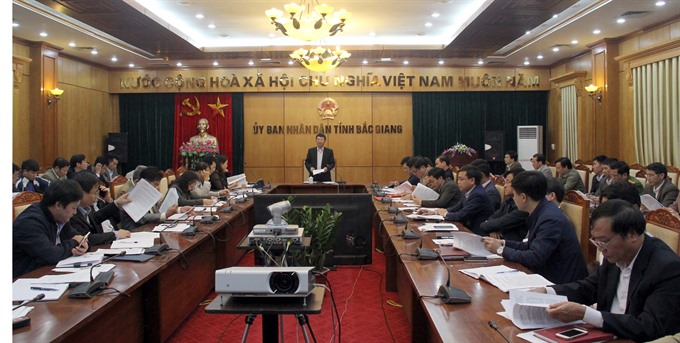 Society
Society

Authorities in the northern province of Bắc Giang have announced that nearly 2,000 enterprises violated regulations on food safety and hygiene last year.
 |
| Talking food: Delegates at the conference on food safety and hygiene. – VNA/VNS Photo Đồng Thúy |
BẮC GIANG — Authorities in the northern province of Bắc Giang have announced that nearly 2,000 enterprises violated regulations on food safety and hygiene last year.
This was confirmed at a conference held by the provincial People’s Committee yesterday.
Provincial authorities set up more than 800 inspection teams to inspect food safety at more than 10,500 enterprises.
Nearly 2,000 of them were found to violate safety regulations.
The inspectors fined more than 500 and began legal proceedings against one enterprise for making fake seasoning.
They seized more than 2,300 litres of alcohol and culled 14,000 poultry and 540kg of pigs of unknown origins. The total fines amounted to more than VNĐ900 million (US$40,000).
Violations included a lack of trade registers and food safety certificates, substandard equipment and infrastructure, and a lack of hygiene and safety while transporting food.
Representatives at the conference noted that ensuring food safety was difficult because punishments were not stringent and equipment used for inspection was scarce. Apart from this, investment in food safety was low.
Lê Ánh Dương, deputy chairman of the Bắc Giang People’s Committee, suggested that this year, authorities at communal level should keep records and classify food enterprises in the area.
He also said the provincial department of health should help raise awareness on food safety for residents and enterprises, and add more equipment for inspection, especially at the district and commune levels.
More education on food safety should be given to people at high risk of food poisoning, including workers and students, Dương said.
The province proposed the Government to complete a national inspection system on food safety from central to grassroots level and provide more investment and manpower.
It also suggested that more inspections should be conducted at the district and commune levels and that inspectors be given proper training.
Another proposal was to have technological norms for different kinds of food as a working basis for food inspection. — VNS




